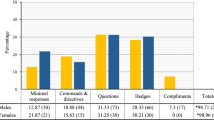Abstract
This research systematically addresses the potential influence of patriarchal culture in motivating men's imposition against women in social conflict. Social conflict in conceptualized here at the level of the dyad, as two actors express differing desires concerning how interaction between them should proceed. A sample of 50 popular movies are analyzed as representative of patriarchal culture and descriptive statistical procedures are applied to isolate associations between variables suggested by an affective model of motivation. Results show that female actors in the movies are stereotypically associated with affective disadvantages in conflict with male actors, and these disadvantages are associated with male-dominant and female-subordinate outcomes of conflict. These cultural associations, termed fundamental sentiments, are proposed to generate parallel affective expectations in men, and emotional motivation for patriarchal imposition when expectations are challenged by nonconsenting women.
Similar content being viewed by others
References
Altheide, D. L. (1987). Ethnographic content analysis.Qualitative Sociology, 10 65–77.
Carney, T. F. (1972).Content analysis: technique for systematic inference from communications. Winnipeg: University of Manitoba Press.
Denzin, N. K. (1991).Images of postmodern Society: Social theory and contemporary cinema. Newbury Park, CA: Sage.
Gordon, L. (1979). The struggle for reproductive freedom: Three stages of feminism. In Z. R. Eisenstein (Ed.),Capitalist patriarchy and the case for socialist feminism. New York: Monthly Review Press.
Groth, A. N. (1979).Men who rape: The psychology of the offender. New York: Plenum Press.
Hanushek, E. A., & Jackson, J. E. (1977).Statistical methods for social scientists. New York: Academic Press.
Hartmann, H. (1981). The unhappy marriage of Marxism and feminism: Towards a more progressive union. In L. Sargent (Ed.),Women and Revolution. Boston: South End Press.
Heise, D. R. (1979).Understanding events: Affect and the construction of social action. New York: Cambridge University Press.
Heise, D. R. (1977). Social action as the control of affect.Behavioral Science, 22 163–177.
Heise, D. R., & Smith-Lovin, L. (1981). Impressions of goodness, powerfulness, and liveliness from discerned social events.Social Psychology Quarterly, 44 93–106.
Herman, D. F. (1989). The rape culture. In J. Freeman (Ed.),Women: A Feminist Perspective. Mountain View, CA: Mayfield Publishing Company.
Kimmel, M. S. (1987). Rethinking “masculinity”: New directions in research on men and masculinity. In M. S. Kimmel (Ed.),Changing men: New directions in research on men and masculinity. Newbury Park, CA: Sage.
Krippendorff, K. (1980).Content analysis: An introduction to its methodology. Beverly Hills, CA: Sage.
Lowett, G., & Linton, J. M. (1989).Movies as mass communication (2nd ed.). Newbury Park, CA: Sage.
Molm, L. D., & Hedley, M. (1991). Gender, power, and social exchange. In C. L. Ridgeway (Ed.),Gender, interaction, and inequality. New York: Springer-Verlag.
Sheffield, C. J. (1989).Sexual terrorism. In J. Freeman (Ed.),Women: A feminist perspective. Mountain View, CA: Mayfield Publishing Company.
Smith-Lovin, L. (1990). Emotion as confirmation and disconfirmation of identity. In T. D. Kemper (Ed.),Research agendas in the sociology of emotions. Albany: State University of New York Press.
Variety. (1987). Big rental films of '86. 14 January, p. 25.
Variety. (1988). Big rental films of '87. 20 January, p. 19.
Variety. (1989). Big rental films of '88. 11–17 January, p. 16.
Variety. (1990). 1989 Top grossers. 10 January, p. 13.
Variety. (1990). Top 10 domestic rentals, 1990. 31 December, p. 10.
Author information
Authors and Affiliations
Rights and permissions
About this article
Cite this article
Hedley, M. The presentation of gendered conflict in popular movies: Affective stereotypes, cultural sentiments, and men's motivation. Sex Roles 31, 721–740 (1994). https://doi.org/10.1007/BF01544289
Issue Date:
DOI: https://doi.org/10.1007/BF01544289




